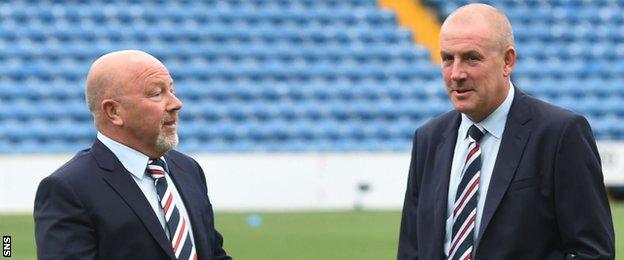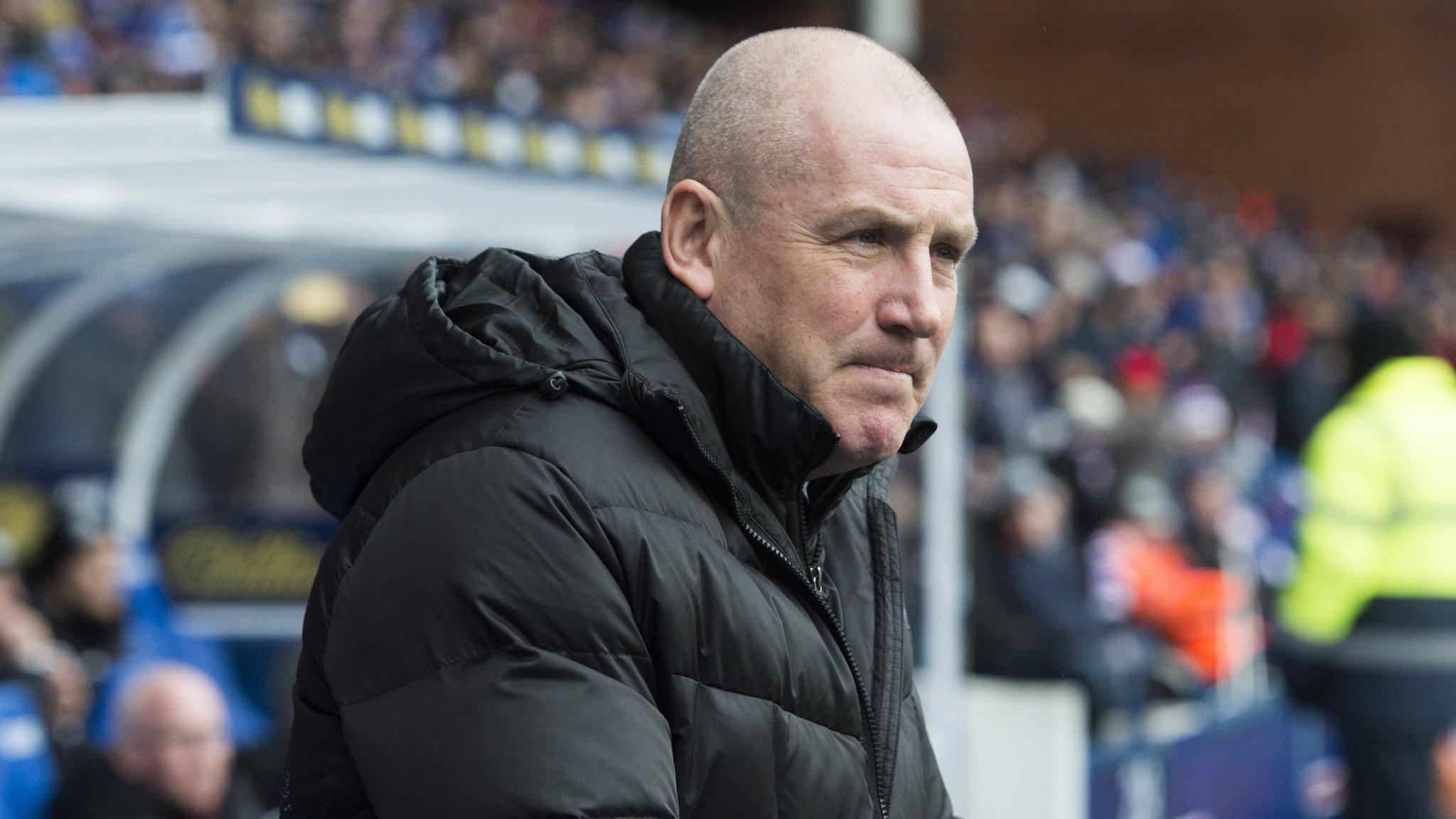Rangers: Where now as Ibrox club hit the reset button after Mark Warburton?
- Published

Lee Wallace was made captain under Mark Warburton
With the departure of Mark Warburton, Rangers have effectively hit the reset button on the club's football operations.
The process has now begun to identify the profile and individuals for two key positions at Ibrox, with a view to recovering the ground lost as Warburton faltered in his last 14 months as manager.
When Warburton was appointed in the summer of 2015, Rangers did not have a full executive team or board of directors in place, and the priority was to find a new manager.
Now managing director Stewart Robertson and director of finance and administration Andrew Dickson will lead the search for a director of football and a head coach.
There may be an interim manager in the meantime, but there are a number of issues to be addressed once Rangers make permanent appointments.
Player recruitment
A scouting network and a recruitment strategy will be the responsibility of the director of football rather than the head coach, and critical to the team's development in the short and long term.
There will now be a recognition at the club that, while responsibility for first-team training and performance should solely belong to the head coach, recruitment must be run separately, with the head coach having a final say on transfers in and out of the club.
Warburton insisted upon the appointment of Frank McParland as head of recruitment, but he was effectively part of the management team and departed at the same time after failing to build a scouting network.

McParland (left) joined Warburton at Ibrox in October 2015
Rangers have a limited budget in historical terms, albeit one that is significantly greater than the resources available to every club in Scotland bar Celtic, and the money needs to be spent more wisely. This requires combining traditional scouting methods with the accumulation and analysis of data - to bespoke parameters - from the first team to academy sides.
The board's recruitment strategy was to sign younger players who can be developed at Ibrox and sold for a profit, to work alongside graduates from the youth academy and more experienced players where required.
That approach will be re-emphasised and a database of players built up to allow more flexibility in the market - rather than chasing one target for each position and being potentially exposed to a premium price - and better value for money by increasing the club's knowledge of foreign players.
Rangers also need to be better at signing the best young or developing players in Scotland, since they tend to move out of reach financially once they are lured to England.
Assess the squad
The current squad has not been capable of the consistency or decisiveness to deliver Rangers' ambitions.
Despite signing four centre-backs, Warburton never established a partnership able to play the high line that he wanted, or be commanding enough to reliably defend set pieces.
Wes Foderingham has improved as a goalkeeper, but doubts remain about his consistency.

Rangers are third in the Scottish Premiership
With the defensive midfield role never adequately filled - Andy Halliday is better suited to playing further forward, Jordan Rossiter has never been fit and Matt Crooks was sent out on loan - and 37-year-old Kenny Miller the regular centre-forward, it is the spine of the team that needs to be strengthened first.
Two centre-backs, a strong, assertive and shrewd central midfielder and a striker who can lead the line and hold up play are the key positions to be filled.
Variety has to be restored to the squad since Warburton signed a number of players of a similar profile - Harry Forrester, Josh Windass, Jason Holt and even the loan players, Emerson Hyndman and Jon Toral, all share the same attributes.
The latter two will leave at the end of the season, while Holt has the potential to develop further. Windass has shown flashes of promise, but Forrester has been unreliable.
In attack, too, Rangers have become muddled. Martyn Waghorn has regularly scored goals but bridles against being played on the right, while Joe Garner, with three goals so far, is yet to deliver as a striker or a £1.7m signing, and Joe Dodoo has been peripheral.
Renewing the squad will require clever business in the transfer market, not least in moving on players who do not have a future at the club.
The McKay question

Barrie McKay, 22, is a Scotland international
If captain Lee Wallace and Miller, who wants to sign a contract extension, are most likely to stay at the club because of their contributions on and off the field, there is a third player whose future remains less certain.
In terms of ability, winger Barrie McKay is a prospect, given his excellent first touch, acceleration, ability to run with the ball and range and pace of passing.
Yet, he is out of contract in 18 months and has not delivered the same number of goals (two) or assists (four) as other players in his position in the Premiership such as Celtic's Scott Sinclair (14 goals and five assists), Hearts' Jamie Walker (11 and three), Aberdeen's Niall McGinn (eight and four), St Johnstone's Danny Swanson (seven and six), Aberdeen's Jonny Hayes (five and 10), or Celtic's James Forrest (four and five).
Either McKay is persuaded to sign a new contract and his development progresses or Rangers cash in on a player who has a market value that could be used to re-invest in the squad.
Similar decisions need to be made about Rob Kiernan, Danny Wilson and Waghorn, who are all out of contract in the summer of 2018.
In terms of players who are out of contract in the summer, Miller wants to remain at Rangers and pursue his coaching career, while fellow veterans Clint Hill and Philippe Senderos are more likely to leave.
- Published15 February 2017

- Published16 February 2017

- Published16 February 2017
